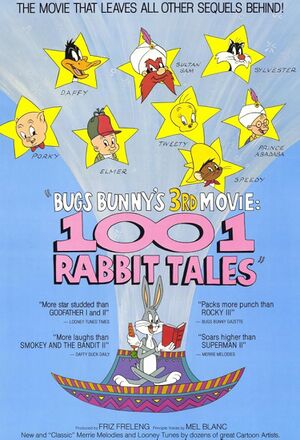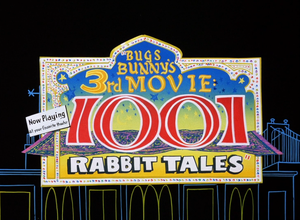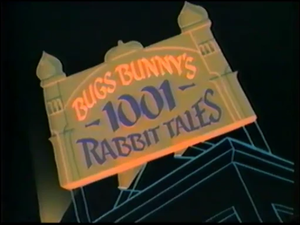Bugs Bunny's 3rd Movie: 1001 Rabbit Tales
| Bugs Bunny's 3rd Movie: 1001 Rabbit Tales | |
|---|---|
 Theatrical poster | |
| Production company | Warner Bros. Animation |
| Distributor | Warner Bros. |
| Release date | November 19, 1982 |
| Run time | 77 minutes |
| Starring | Mel Blanc June Foray Shep Menkin Lennie Weinrib |
| Producer(s) | Friz Freleng |
| Music composition | Rob Walsh Classic material: Carl Stalling Milt Franklyn William Lava |
| Story | John Dunn David Detiege Friz Freleng |
| Director(s) | Friz Freleng |
| Series navigation | |
| ← Previous | Next → |
| Title card | |

| |
| Second title card | |

| |
Bugs Bunny's 3rd Movie: 1001 Rabbit Tales, also known as Bugs Bunny's 1001 Rabbit Tales, is an anthology film released by Warner Bros. It was produced and directed by Friz Freling (although uncredited in the latter role), and was released on November 19, 1982. It is the third compilation film of the Looney Tunes/Merrie Melodies cartoon shorts with newly made bridging segments, preceded by The Bugs Bunny/Road Runner Movie (1979) and The Looney Looney Looney Bugs Bunny Movie (1981). Like its previous entries, the film was hosted by Bugs Bunny in the aforementioned segments.
Bugs and Daffy end up in the middle of the Arabian desert, where a sultan (Yosemite Sam) forces them to read bedtime stories to his spoiled son. Bugs uses his storytelling skills—mainly consisting of classic shorts—to the boy so he can save himself from imminent danger.
Detailed summary
Bugs Bunny and Daffy Duck are rival book salesmen from Rambling House. They each go their separate ways to sell books to folks, Daffy finds himself encountering Elmer Fudd and Porky Pig. Bugs gets forced by Sultan Yosemite Sam to tell stories to his spoiled-brat son, Prince Abba-Dabba. The stories are shown through clips of old Warner Bros.' Looney Tunes and Merrie Melodies cartoons.
Featured cartoons
- Cracked Quack - Daffy's line, "We'll just put it away in the storage for the winter", is replaced with, "Thermopolis will just have to wait."
- Apes of Wrath - Bugs' line, "So I'll be a monkey", is replaced with, "I'll sell books later."
- Wise Quackers - The opening where Daffy is flying and crash-lands like a plane on a farm and onto a pitchfork and encounters Elmer Fudd
- Ali Baba Bunny - ending to cartoon appears later on with Bugs removed
- Tweety and the Beanstalk - Chinese Tweety at the ending removed.
- Bewitched Bunny - Ends abruptly after the confused prince leaves the house upon learning from Bugs that he's in the wrong fairytale.
- Goldimouse and the Three Cats - Bugs reads the narrator's lines. In addition, Sylvester Jr's final line "Eeehh, porridge! What a father!" at the end is also removed.
- A Sheep in the Deep - Bugs narrates the story of "A Wolf in Sheep's Clothing" throughout the entire short. Only shown on television airings in the 1980s to 1990s (on CBS, Disney Channel, and Family Channel). The original theatrical version does not contain this short, as it was deleted from the final cut.
- Red Riding Hoodwinked
- The Pied Piper of Guadalupe and Mexican Boarders - This story used the latter in the middle and the beginning and ending of the former.
- One Froggy Evening - The ending was cut off when the man puts Michigan J. Frog back to where he first found him and quietly makes his getaway.
- Aqua Duck - flipped and only shown up to the point where Daffy realizes the pool of water is a mirage.
Memorable quotes
Characters
In order of appearance: | ||||||||||||||||||||||||||||||||||||||||||||||||||||||||||||||||||||||||||||||||
| ||||||||||||||||||||||||||||||||||||||||||||||||||||||||||||||||||||||||||||||||
Note: Ralph Wolf and Sam Sheepdog only appear in the cut "Wolf in Sheep's Clothing" segment.
Organizations
Locations
Objects
Vehicles
Production
Development
Filming
Music
Crew credits
Release
Dates are in order of release:
- United States: November 19, 1982
Behind the scenes
- The main plot point, setting up Bugs and Daffy as Scheherazade-like figures, is in itself similar to the 1959 Merrie Melodies short, Hare-abian Nights, which itself used considerable stock footage and also featured Yosemite Sam as the sultan.
- An interesting aspect of this film is that many voice artists that were not credited in the original shorts are billed as "additional classic voices". For the first time, over twenty years after his death, Arthur Q. Bryan receives credit on a Warner Bros. production, even if it does fail to credit him as the voice of Elmer Fudd.
- The film marks the first time that a Warner cartoon compilation feature used classic cartoon footage from more than one director. One Froggy Evening, Bewitched Bunny and Ali Baba Bunny were directed by Chuck Jones, and Aqua Duck was directed by Robert McKimson, while all other shorts included were directed by Friz Freleng.
- The character Prince Abba-Dabba may be based on the Junior character from the 1958 Looney Tunes short, A Waggily Tale.
Errors
Critical reception
In other languages
| Language | Name | Meaning |
|---|---|---|
Home availability
- In the United States:
- In the United Kingdom and Ireland: